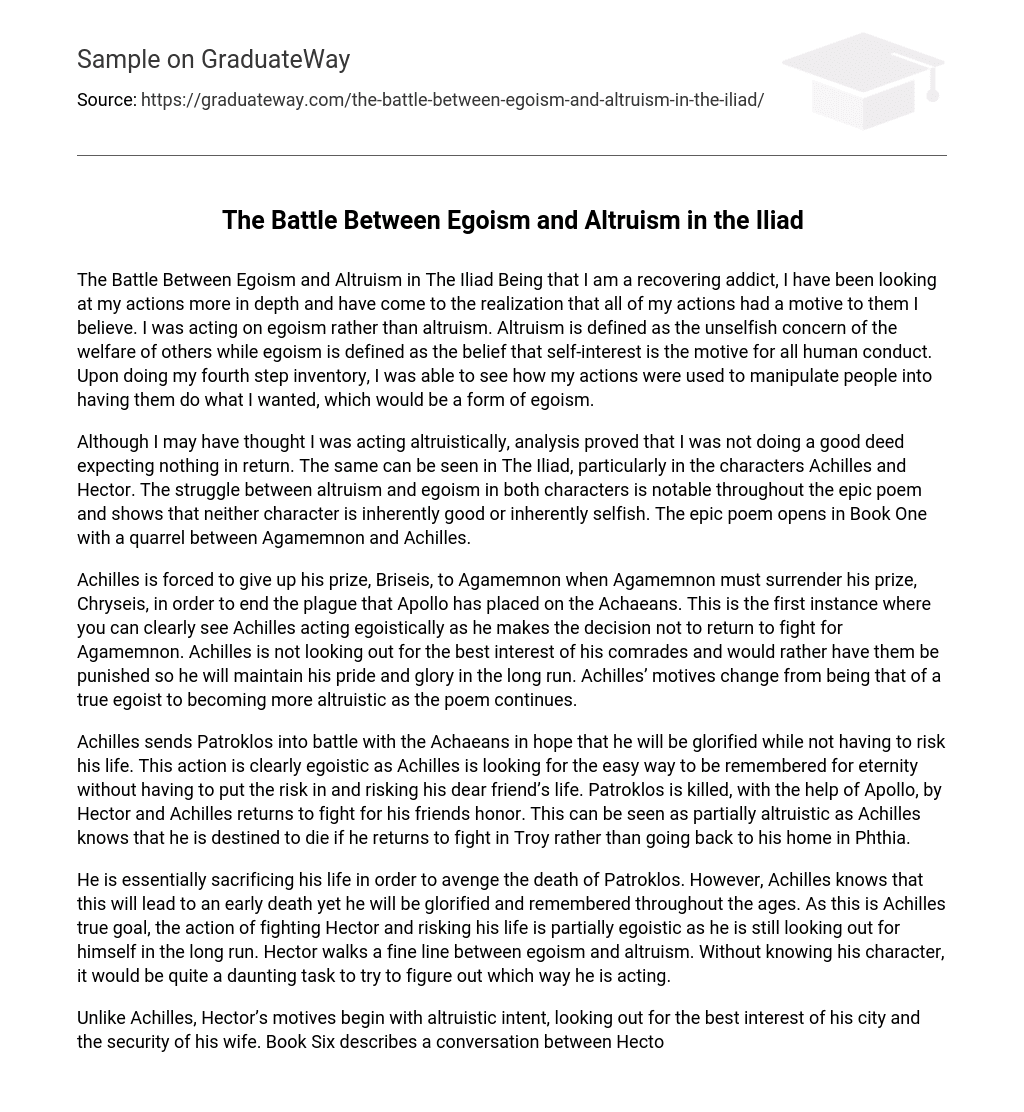The Battle Between Egoism and Altruism in The Iliad Being that I am a recovering addict, I have been looking at my actions more in depth and have come to the realization that all of my actions had a motive to them I believe. I was acting on egoism rather than altruism. Altruism is defined as the unselfish concern of the welfare of others while egoism is defined as the belief that self-interest is the motive for all human conduct. Upon doing my fourth step inventory, I was able to see how my actions were used to manipulate people into having them do what I wanted, which would be a form of egoism.
Although I may have thought I was acting altruistically, analysis proved that I was not doing a good deed expecting nothing in return. The same can be seen in The Iliad, particularly in the characters Achilles and Hector. The struggle between altruism and egoism in both characters is notable throughout the epic poem and shows that neither character is inherently good or inherently selfish. The epic poem opens in Book One with a quarrel between Agamemnon and Achilles.
Achilles is forced to give up his prize, Briseis, to Agamemnon when Agamemnon must surrender his prize, Chryseis, in order to end the plague that Apollo has placed on the Achaeans. This is the first instance where you can clearly see Achilles acting egoistically as he makes the decision not to return to fight for Agamemnon. Achilles is not looking out for the best interest of his comrades and would rather have them be punished so he will maintain his pride and glory in the long run. Achilles’ motives change from being that of a true egoist to becoming more altruistic as the poem continues.
Achilles sends Patroklos into battle with the Achaeans in hope that he will be glorified while not having to risk his life. This action is clearly egoistic as Achilles is looking for the easy way to be remembered for eternity without having to put the risk in and risking his dear friend’s life. Patroklos is killed, with the help of Apollo, by Hector and Achilles returns to fight for his friends honor. This can be seen as partially altruistic as Achilles knows that he is destined to die if he returns to fight in Troy rather than going back to his home in Phthia.
He is essentially sacrificing his life in order to avenge the death of Patroklos. However, Achilles knows that this will lead to an early death yet he will be glorified and remembered throughout the ages. As this is Achilles true goal, the action of fighting Hector and risking his life is partially egoistic as he is still looking out for himself in the long run. Hector walks a fine line between egoism and altruism. Without knowing his character, it would be quite a daunting task to try to figure out which way he is acting.
Unlike Achilles, Hector’s motives begin with altruistic intent, looking out for the best interest of his city and the security of his wife. Book Six describes a conversation between Hector and his wife Andromache where she is pleading with him not to go back into battle. It appears that Hector is acting altruistically because he is going to fight to defend the city, knowing that he is destined to die. However, upon further delving, a motivation for Hector to go into battle is because he does not want to live seeing his wife become enslaved by the Achaeans.
Hector also has a belief that he will not be killed in the battle with Achilles, wearing his armor as a symbol barrier against mortality. The act of fighting Achilles becomes a means to have his name be glorified rather than defending his city. Hector also shows his shift from altruism to egoism when Patroklos enters the battle wearing Achilles’ armor in Book Sixteen. After mocking Paris for retreating, Hector twice is depicted leading the retreat back for the city when he sees Patroklos in the battle (whom he believes is Achilles).
He returns back to the battle after Glaucus and his uncle shame him. Hector is acting on egoism as he is looking in the best interest of himself when he leaves the battle. If he were truly being altruistic, he would have stayed and fought till the end to defend his city. However, Hector is a human who is mortal and thus was looking out for his own self. Driven by his own will to live, Hector acts egoistically. Achilles and Hector seem to switch roles from the beginning of the epic poem to the end. Achilles is the egoist who becomes an altruist to fight for the honor of his beloved friend.
On the other hand, Hector is the altruist looking out for the best interest of the city who becomes an egoist, only fighting for his own glory. Human beings, as shown in through these characters, are neither completely good nor evil, but more of an amalgamation of both. That is what truly makes us human; we can neither be perfect nor act completely selfish. People can change, for better or for worse, and the ebb and flow of life brings us to act differently under each circumstance. Someone who was once thought to act selflessly in an instant can become egocentric and selfish.





